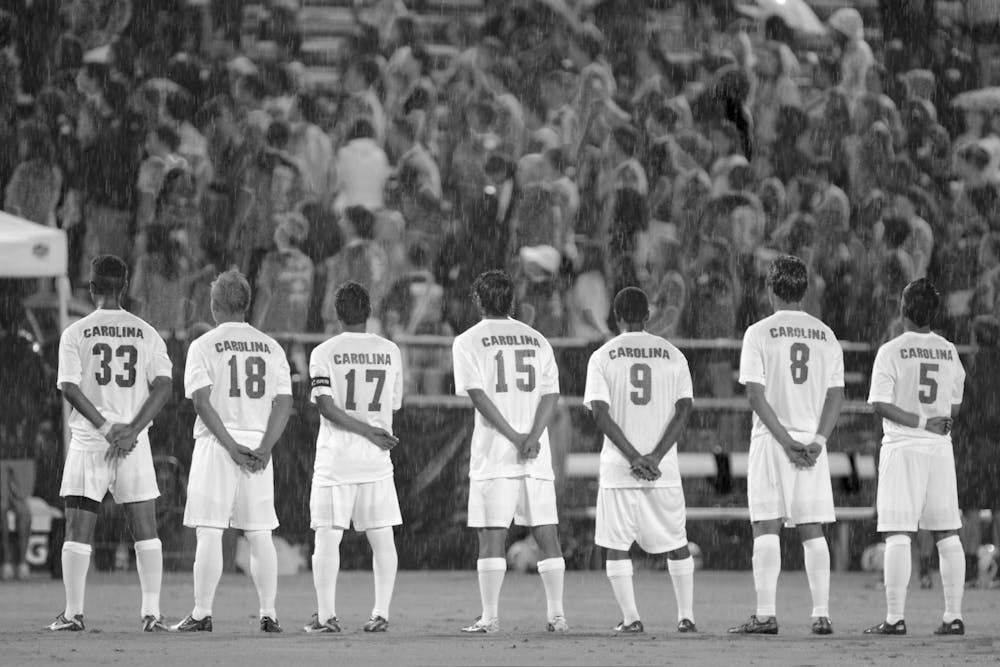In a Friday evening interview on the NCAA’s Twitter account, NCAA President Mark Emmert further lengthened the shadow looming over the 2020 college football season. Schools won’t be able to compete in fall sports, he said, if students can’t return to campus for the semester.
“If a school doesn’t reopen, then they’re not going to be playing sports,” he said. “It’s really that simple.”
Per Business Insider, college football revenue dwarfs that of other sports — including men’s basketball — and made more money on average than the next 35 highest-earning sports combined. Without a football season, it’s difficult to imagine how the costs of virtually every other sport will be covered — or, Andrews said, how those at the top of the college sports world can justify their sizable salaries.
“I can’t imagine we’re playing college football this fall. I just can’t imagine it,” he said. “So when that money isn’t coming in, how [UNC athletic director] Bubba Cunningham can justify his salary, how Mack Brown, how Roy Williams can justify … I can’t imagine too many people want to hear that, but in a time when a lot of people are feeling the pinch, that seems like an awful lot of money going to people who aren’t going to be doing work in the next year. At no fault of their own, but that’s not how the world works.”
“You think about guys like [Alabama football’s Nick Saban] and [Clemson football’s Dabo Swinney], and these guys making 6, 8, 9, $10 million a year — I hope they’re going to give some of it back this year if they’re not coaching football,” Andrews continued. “I wouldn’t bet on it.”
Since Andrews’ interview with the DTH in late April, Kansas basketball’s Bill Self and Syracuse basketball’s Jim Boeheim have become two of the high-profile college coaches to take pay cuts. Still, the economic impact of COVID-19 on sports has already reared its head. Dozens of programs have furloughed or handed pay cuts to employees, while schools like Cincinnati and Old Dominion have been forced to ax programs entirely.
And more could be on the way. In a letter to Emmert, commissioners of the Group of Five conferences asked for the right to cut more teams and dip below the required number of 16 programs per school — economic relief, the letter said, from “the direst financial crisis for higher education since at least the Great Depression.”
To get the day's news and headlines in your inbox each morning, sign up for our email newsletters.
Near the beginning of the pandemic, one of Andrews’ students in his course The Olympic Games: A Global History asked him if he thought the 2020 Games would be impacted. Absolutely not, he responded.
“’No way. No way the Olympics are going to be postponed or canceled. There’s just way too much money out there,’” Andrews recalled saying. “That shows you how much I know.”
Much has changed since then. On March 24, the Tokyo Olympics were postponed to 2021. And “Agony of Defeat” is on hold while Andrews and Weiler continue work on their new University-sponsored podcast, “COVID Conversations," which features episodes on topics like the concept of herd immunity. The show's stated mission is to "make sense of the extraordinary social measures and economic impacts" created by the pandemic.
In an episode from May 7 titled “Your Season is Canceled: Will sports lose their relevance on campus in the wake of COVID-19?”, Weiler mentioned a New York Times story about a still-active basketball league in Taiwan. One player said the league’s current conditions — playing in empty arenas, without fans — makes it feel "like an adult league."
“The way pro athletes experience play is so inextricably tied to their surroundings,” Weiler said in an interview. “I just think it’s going to feel so weird if they try and do it [without fans].
“Sporting arenas are these really important spaces where we come together and process moments like this, grieve about things like this, whether it’s a World War, whether it’s September 11," Andrews added. "Right or wrong — maybe it’s wrong, but it is what it is — sports arenas are our most important civic gathering spaces.”
Now that’s gone, and likely will be, for the foreseeable future. What's likely coming — Sam Howell and Garrison Brooks playing in empty venues, if at all — will feel like a strange re-creation of the pre-pandemic sporting world, one that will force fans to make concessions they have never before made.
In the meantime, Weiler said he will start watching sports he had never considered following.
“I am personally not a soccer fan. But I know the Bundesliga is getting ready to start play soon without fans,” Weiler said. “And I’ve been only semi-joking with people: I’m about to become a huge Bundesliga fan.”
@ryantwilcox
@DTHSports | sports@dailytarheel.com



